Snapped a few photos of the new bicycle boulevard pavement markings I mentioned a few days ago. These are the first of “700 or so” that the city will install in the next few weeks. These markings will guide cyclists onto low-traffic through streets and will be yet another sign to motorists that they aren’t the only ones on the road.
These photos are from NE 37th and Holman. View all the photos here.



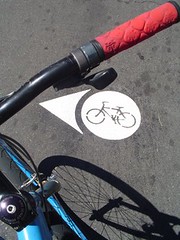
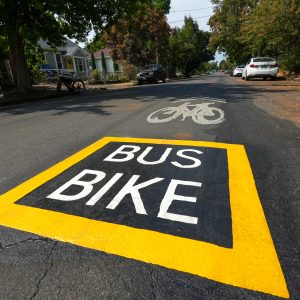
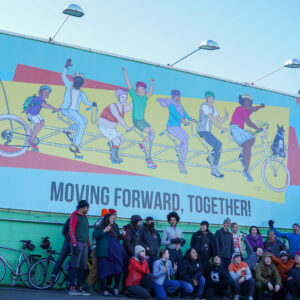
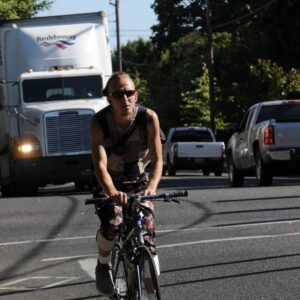
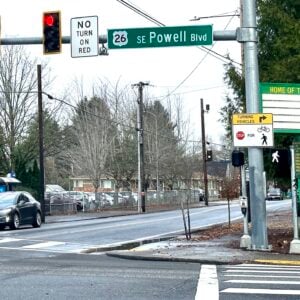
Thanks for reading.
BikePortland has served this community with independent community journalism since 2005. We rely on subscriptions from readers like you to survive. Your financial support is vital in keeping this valuable resource alive and well.
Please subscribe today to strengthen and expand our work.
Boy, it might just be due to the perspective of the photo, but those seem really small! While a cyclist can easily see them, the important part is for the motorists to see them. I hope from a vehicle, they’re more obvious than they look in the picture.
Eric:
Yes, they are on the small side. Perhaps this photo will give you a better sense of the size.
I think it’s important to note that these are more bike route markings and less bike safety markings…therefore they’re not meant to be as large as the sharrows for instance.
Thanks for your comment.
Boy, it might just be due to the perspective of the photo, but those seem really small! While a cyclist can easily see them, the important part is for the motorists to see them. I hope from a vehicle, they’re more obvious than they look in the picture.
They are small: 1-foot in diameter. As Jonathan says they are primarily intended as route identification and way-finding for cylcists. Unlike streets with bicycle lanes, bicycle boulevards are not so obvious. The improvements on them are more subtle and hard to follow without a map or signing. These markings are intended to make a bicycle boulevard route as easy to follow as a street with bicycle lanes.
We considered going with big bike markings as are used in Berkeley and Vancouver, BC. While we want these routes to be readily apparant to cyclists, we don’t want motorists to start following the routes. We also hope to not have to maintain these markings: we’re placing them so cars don’t run over them and intend for them to last as long as the pavement itself. Larger markings would get worn over time and need more maintenance. In these days of very limited dollars for the City’s Office of Transportation, we’re looking to minimize our maintenance requirements.
Larger markings would undoubtedly better communicate the idea “bike street” to motorists, but the presence of more cyclists would also do that. Fortunately we don’t hear a lot of reports of negative interactions between motorists and cyclists on our bike boulevard streets. Not to say negative things don’t happen, but it seems to be a more minor consideration compared to the problem of people just not being able to find the boulevards.
That’s kind of a morbid picture where you used a helmet on the ground to indicate the size of the markings.
I also avoid riding over the markings because I’m afraid they’ll reduce my speed, even if just a little.
Eric:
Yes, they are on the small side. Perhaps this photo will give you a better sense of the size.
I think it’s important to note that these are more bike route markings and less bike safety markings…therefore they’re not meant to be as large as the sharrows for instance.
Thanks for your comment.
They are small: 1-foot in diameter. As Jonathan says they are primarily intended as route identification and way-finding for cylcists. Unlike streets with bicycle lanes, bicycle boulevards are not so obvious. The improvements on them are more subtle and hard to follow without a map or signing. These markings are intended to make a bicycle boulevard route as easy to follow as a street with bicycle lanes.
We considered going with big bike markings as are used in Berkeley and Vancouver, BC. While we want these routes to be readily apparant to cyclists, we don’t want motorists to start following the routes. We also hope to not have to maintain these markings: we’re placing them so cars don’t run over them and intend for them to last as long as the pavement itself. Larger markings would get worn over time and need more maintenance. In these days of very limited dollars for the City’s Office of Transportation, we’re looking to minimize our maintenance requirements.
Larger markings would undoubtedly better communicate the idea “bike street” to motorists, but the presence of more cyclists would also do that. Fortunately we don’t hear a lot of reports of negative interactions between motorists and cyclists on our bike boulevard streets. Not to say negative things don’t happen, but it seems to be a more minor consideration compared to the problem of people just not being able to find the boulevards.
That’s kind of a morbid picture where you used a helmet on the ground to indicate the size of the markings.
I also avoid riding over the markings because I’m afraid they’ll reduce my speed, even if just a little.